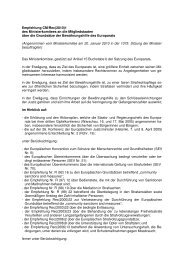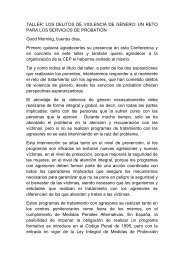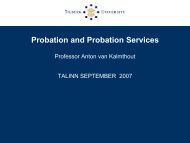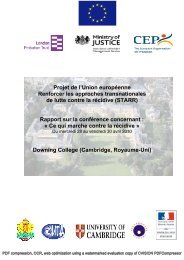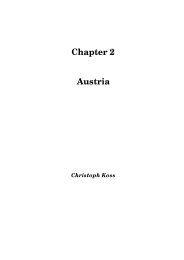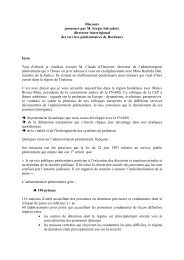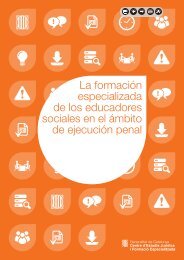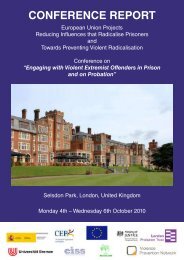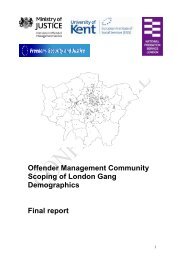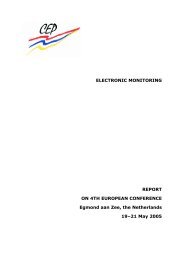Monitoring Hate Crime - CEP, the European Organisation for ...
Monitoring Hate Crime - CEP, the European Organisation for ...
Monitoring Hate Crime - CEP, the European Organisation for ...
Create successful ePaper yourself
Turn your PDF publications into a flip-book with our unique Google optimized e-Paper software.
Murder or homicide as well as bodily injury, damage of property, offensive graffiti, insult,<br />
intimidation, vandalism, obscene telephone calls etc. Victim of “hate crimes” can be a person,<br />
a group of persons, an organisation, a state or religious institutions. 3<br />
All “hate crime” consists of criminalized acts or omissions that become “hate crimes” by <strong>the</strong><br />
subjective motivation of <strong>the</strong> offender only and it is just <strong>the</strong> motivation of <strong>the</strong> offender that is<br />
generally so extremely difficult to recognize and to prove. Only in some cases circumstantial<br />
evidence will make <strong>the</strong> offender’s intent obvious.<br />
Often a background investigation of <strong>the</strong> accused or eyewitness reports of <strong>the</strong> crime are <strong>the</strong><br />
only means to detect <strong>the</strong> offender’s intent. That is even more a weak basis as legislators in<br />
some countries (United States of America, England and Belgium) are convinced that if an<br />
offence was motivated by hatred it is automatically a qualified offence that must be punished<br />
with more hardship than ordinary offences. But is it correct indeed, to reproach somebody<br />
extra <strong>for</strong> his or her motives In literature and by practice <strong>the</strong>re are different answers given to<br />
this question in Europe. In <strong>the</strong> absence of clear definitions and common criteria about what<br />
<strong>the</strong> motives must be like to qualify an ordinary offence to become a hate crime a lot of doubts<br />
and uncertainties arise. Fur<strong>the</strong>rmore subjective motives are judged by <strong>the</strong> subjective opinions<br />
of <strong>the</strong> police and <strong>the</strong> public prosecutors 4 who have to decide whe<strong>the</strong>r <strong>the</strong> offence committed<br />
was a “hate crime” or not. The “hate crime concept” cannot offer legal certainty 5 and thus it<br />
is not in con<strong>for</strong>mity with <strong>the</strong> principle of legality. 6 Obviously this is a major problem and an<br />
argument against adopting <strong>the</strong> term “hate crime”.<br />
The importance of this avoidance is stressed by <strong>the</strong> not less important circumstance that <strong>the</strong><br />
term “hate crime” points so strongly in <strong>the</strong> direction of ra<strong>the</strong>r spectacular incidents of violent<br />
crime. In reality however, <strong>the</strong>re is a high number of not at all spectacular discriminatory<br />
offences disturbing public peace as well as <strong>the</strong> well-being of those becoming victims of<br />
criminal and o<strong>the</strong>r discrimination, while <strong>the</strong> extent of intense racist violence and crime is<br />
according to empirical research relatively moderate. 7<br />
The considerable difference between <strong>the</strong> American hate crime concept and our criminal<br />
discrimination concept is <strong>the</strong> result of <strong>the</strong> fact that in America <strong>the</strong> importance given to<br />
freedom of speech does not allow <strong>the</strong> creation of something like our concept of specific<br />
3 See <strong>for</strong> example 422.6 Cali<strong>for</strong>nia Penal Code<br />
4 Ch. Brants, R. Kool, A. Rignalda, Strafbare discriminatie, Willem Pompe Instituut voor Strafrechtspleging,<br />
Universiteit Utrecht; WODC, Ministerie van Justitie, 2007, p. 240.<br />
5 Rechtssicherheit.<br />
6 Ch. Brants, R. Kool, A. Rignalda, Strafbare discriminatie, Willem Pompe Instituut voor Strafrechtspleging,<br />
UU, WODC, Ministerie van Justitie, 2007, p. 239.<br />
7 Ch. Brants, R. Kool, A. Rignalda, WODC, Ministerie van Justitie, Strafbare discriminatie, p. 246.<br />
2


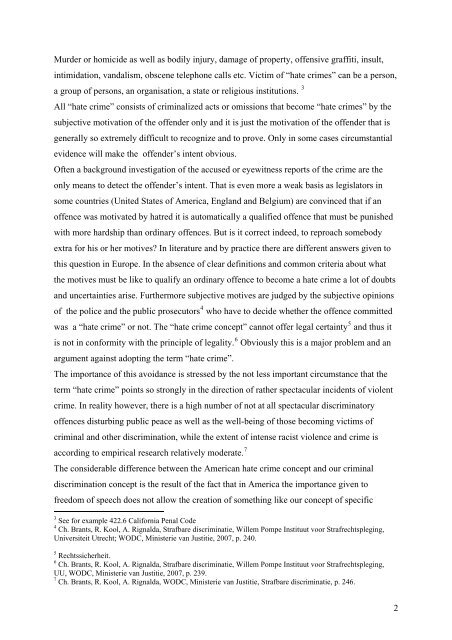
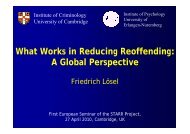
![AGIS2 Nov 08 Conference Report_[Version 2] - CEP, the European ...](https://img.yumpu.com/50764570/1/190x245/agis2-nov-08-conference-report-version-2-cep-the-european-.jpg?quality=85)
